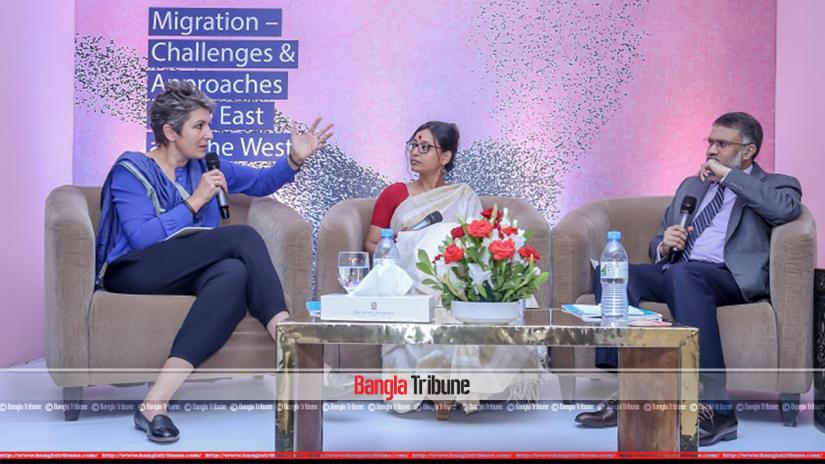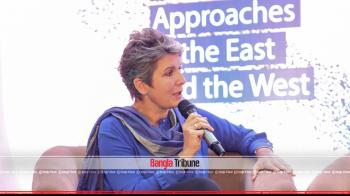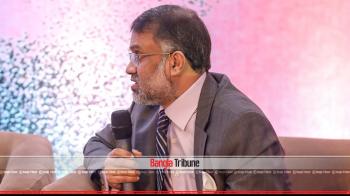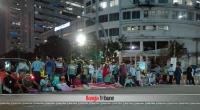 Bangladesh has to accept that the Rohingyas will stay here for a long time, says Ines Pohl, chief editor of Germany’s public international broadcaster, Deutsche Welle (DW).
Bangladesh has to accept that the Rohingyas will stay here for a long time, says Ines Pohl, chief editor of Germany’s public international broadcaster, Deutsche Welle (DW).
She made the remark on Saturday (Oct 13) during a discussion ‘Migration — Challenges and Approaches in the East and the West’ with bdnews24.com’s Editor-in-Chief Toufique Imrose Khalidi in Dhaka.
Pohl, who recently visited the Rohingya camps in Cox’s Bazar, said that it will not be easy to send back the Rohingyas, who have escaped barbaric prosecution in Rakhine.
The moderator of the event, Debarati Guha, head of DW Asia Programme asked whether the Rohingya’s complete dependency on aid will pose a major challenge in the coming months. Pohl said that security for women and young girls, child marriage and human rights are currently the biggest challenges.
Pohl said that security for women and young girls, child marriage and human rights are currently the biggest challenges.
“I have seen that the Rohingya children are eager to learn. The international community should try to meet their educational needs, as well as give them the chance to get integrated into the society,” Polles said.
“It is easier said than done,” Toufique Imrose Khalidi said to her comment adding, “There is a huge gap in the coordination of funds.”
“Since Bangladesh has limited resources, we need billions of dollars of donations for them.”
Myanmar had an agreement with Bangladesh to complete the repatriation within two years but the government and the international community understands that they will be staying, said Khalidi.
He said that a lot of them do not want to go back. They have a better life here than back home where they had to face inhuman brutality. “Life is harder there. They have seen their parents raped brutally, gang-raped. They have seen their parents killed. They think that, whatever the conditions may be, these camps are still better than the conditions back home in Rakhine.”
Both Khalidi and Pohl agreed on deploying adequate police forces to ensure security in such a huge camp and Pohls suggested that they start community policing by training people from the Rohingya community.
The Myanmar army launched an ethnic-cleansing on the Rohingyas, on Aug 25 last year, forcing over 700,000 of the ethnic minority in Rakhine to cross the border and take shelter in overcrowded camps in Cox’s Bazaar. The current number of Rohingyas living in Bangladesh has crossed a million now.
Deutsche Welle (DW) Distribution Executive of in South Asia Tobias Grote-Beverborg and Bangla Tribune Head of News and DW Bangladesh Correspondent Harun Ur Rashid attended the discussion among others.
 Others
Others
41304 hour(s) 23 minute(s) ago ;
Evening 07:18 ; Thursday ; Jul 03, 2025
‘Rohingyas will be here for a long time’
Send
Bangla Tribune Report
Published : 21:05, Oct 13, 2018 | Updated : 21:21, Oct 13, 2018
Published : 21:05, Oct 13, 2018 | Updated : 21:21, Oct 13, 2018
0 ...0 ...
/so/st/
Topics: Top Stories
- KOICA donates medical supplies to BSMMU
- 5 more flights to take back British nationals to London
- Covid19: Rajarbagh, Mohammadpur worst affected
- Momen joins UN solidarity song over COVID-19 combat
- Covid-19: OIC to hold special meeting
- WFP begins food distribution in Cox’s Bazar
- WFP begins food distribution in Cox’s Bazar
- 290 return home to Australia
- Third charter flight for US citizens to return home
- Dhaka proposes to postpone D8 Summit
Unauthorized use of news, image, information, etc published by Bangla Tribune is punishable by copyright law. Appropriate legal steps will be taken by the management against any person or body that infringes those laws.
Bangla Tribune is one of the most revered online newspapers in Bangladesh, due to its reputation of neutral coverage and incisive analysis.
F R Tower, 8/C Panthapath, Shukrabad, Dhaka-1207 | Phone: 58151324; 58151326, Fax: 58151329 | Mob: 01730794527, 01730794528


